Over 130 health leaders, 16 Chiefs and 26 proxies gathered December 11-13 on Snaw-naw-as territory in Parksville for the Vancouver Island regional caucus. Priorities of Island families over the few days included discussion on the Pharmacare Plan W transition, Jordan's Principle, the opioid public health emergency, and dialogue on the social determinants of health.
Elder Anne Bob (L) and Chief Georgina Livingstone of Lake Cowichan First Nation share a family moment and welcomed delegates to the traditional Snaw-naw-as territory.
Elder Anne Bob and Councillor Cheryl Jones from Snaw-naw-as opened with heartfelt words for the delegates – encouraging those in the room to work together for the better of their children and communities. Tsow-Tun Le Lum Society also welcomed delegates, providing emotional support and brushing on site. Vancouver Island Living Marker Jenn Smith shared reflections from the last year of work, including reminder that health transfer will take time and that transformation will not happen overnight. "We need to keep meeting, building and nurturing relationships. The living markers are watching and learning," she said. "We should look back to see what did not work so that we can look forward and build together to repair relationships and partnerships."
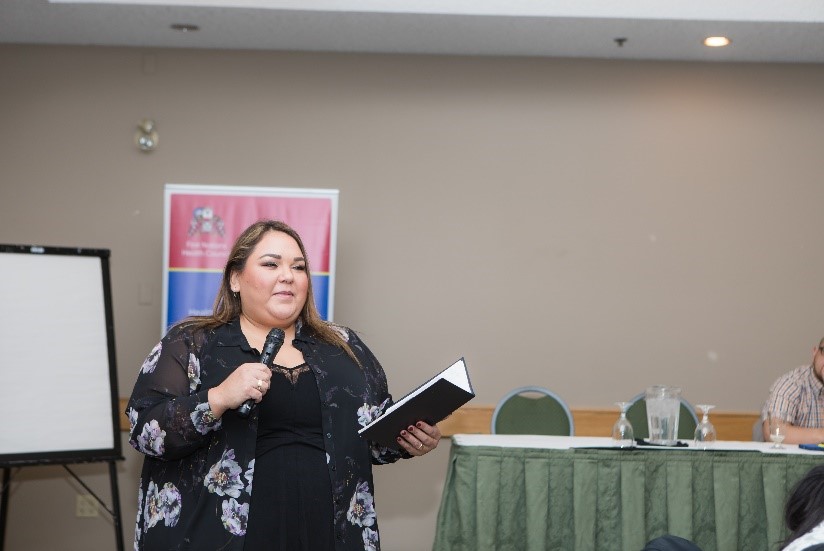
Jenn Smith, Vancouver Island Living Marker offering opening comments to the caucus.
Service Updates
Day one included reporting on major FNHA projects including the annual report, transition to pharmacare, emergency response including wildfire and the opioid public health emergency.
"I want to acknowledge those affected by the overdose public health emergency," said Dr. Shannon McDonald, deputy Chief Medical Officer. "We're talking about a pain problem. People are using substances to deal with physical, spiritual, and emotional pain."
Sonia Isaac-Mann, Executive Director of Community Health and Wellness with FNHA, noted that Jordan's Principle was established because of a child that did not receive service due to jurisdictional dispute in Manitoba. The FNHA is responsible for administering Jordan's Principle resources in British Columbia for all First Nations regardless of location. This approach does not limit or relieve the federal government of its fiduciary responsibilities to First Nations in BC. The approach includes working with service partners to ensure that children have access to all of the services that they need. More information on Jordan's Principle can be found at www.fnha.ca/jordansprinciple, by calling 1.866.913.0033 or emailing Jordans.Principle@fnha.ca.
John Mah, Vice President of Health Benefits with FNHA, discussed the transition to PharmaCare. Approximately 400,000 prescriptions have been filled to date since the transition. Initially there were 250 calls a day received from people with challenges at the Pharmacy. Call volumes today, which include all health benefits areas have steadily declined, to approximately 100 calls a day. Those community members having challenges with prescriptions or seeking reimbursement were encouraged to call the Health Benefits line: 1.855.550.5454.
A regional update on the partnership work of Island Health and the FNHA was followed by a dialogue on the work in health over the year. The FNHC rounded off day one with a presentation and brief dialogue on work in the social determinants of health. Political representatives sought clarity and defining the work underway, to ensure the overall direction is driven by First Nations communities in BC, and that Island decisions are made by Island community leadership.
Oyster Bay Open for Business!
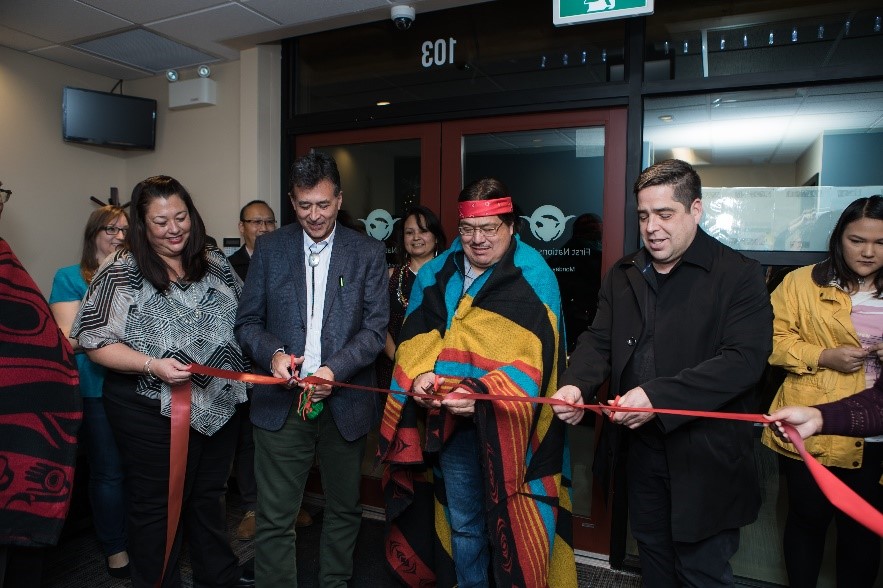
(L-R) FNHA Vancouver Island Regional Director Brennan MacDonald, FNHA Chief Operating Officer Richard Jock, Stz'uminus Chief Councillor John Elliott and FNHA Board Treasurer Jason Calla cut the ribbon at the new FNHA Oyster Bay office in Ladysmith on Dec. 11.
After the business of the day wrapped up, delegates were invited to the opening of the new Vancouver Island regional office at Oyster Bay in Ladysmith. The event was a packed house and included a ribbon cutting with Stz'uminus Chief Councillor John Elliott and members of the FNHA and FNHC. The opening of this office signified the move of all Vancouver Island FNHA offices to now be within First Nations community territories – a significant milestone.
"Establishing our Vancouver Island offices in our territories supports us to be present when our communities need us," said Brennan MacDonald, FNHA Vancouver Island Regional Director. "We are incredibly thankful to the Stz'uminus First Nation for hosting us in Oyster Bay."
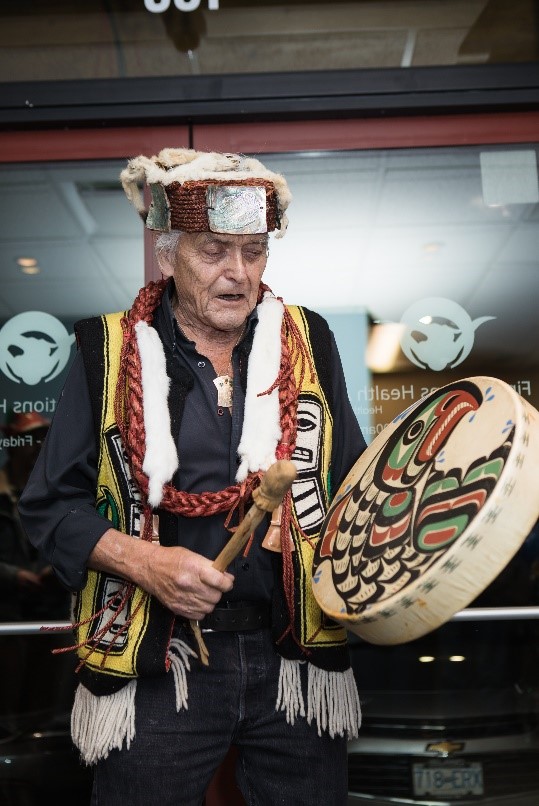
Vancouver Island Corner Post Bill Cramner offering a prayer song at the FNHA Oyster Bay office opening ceremony.
Nation-to-Nation Conversations
Day two caucus agenda items included Advancing a Nation-to-Nation Relationship; Children and Family Wellbeing; Mental Health and Addictions; and Emergency Management. Day two opened with Elder Anne Bob, and comments from the Vancouver Island Corner Post Bill Cramner and Living Marker Jenn Smith. Bill Cramner called on the Creator to bless the work that needs to be done, while Jenn Smith reflected on delegates trying to move forward in a good way, and spoke of her grandmother Janet, who would be so proud of the work that is being done today.
The morning opened with promising community-driven practices in relation to children and family wellness. Island organizations Kw'umut Lelum Child and Family Services, Usma Nuu-chah-nulth Family and Child Services and Sasamans Society co-presented on their community-driven approaches to supporting Island families.
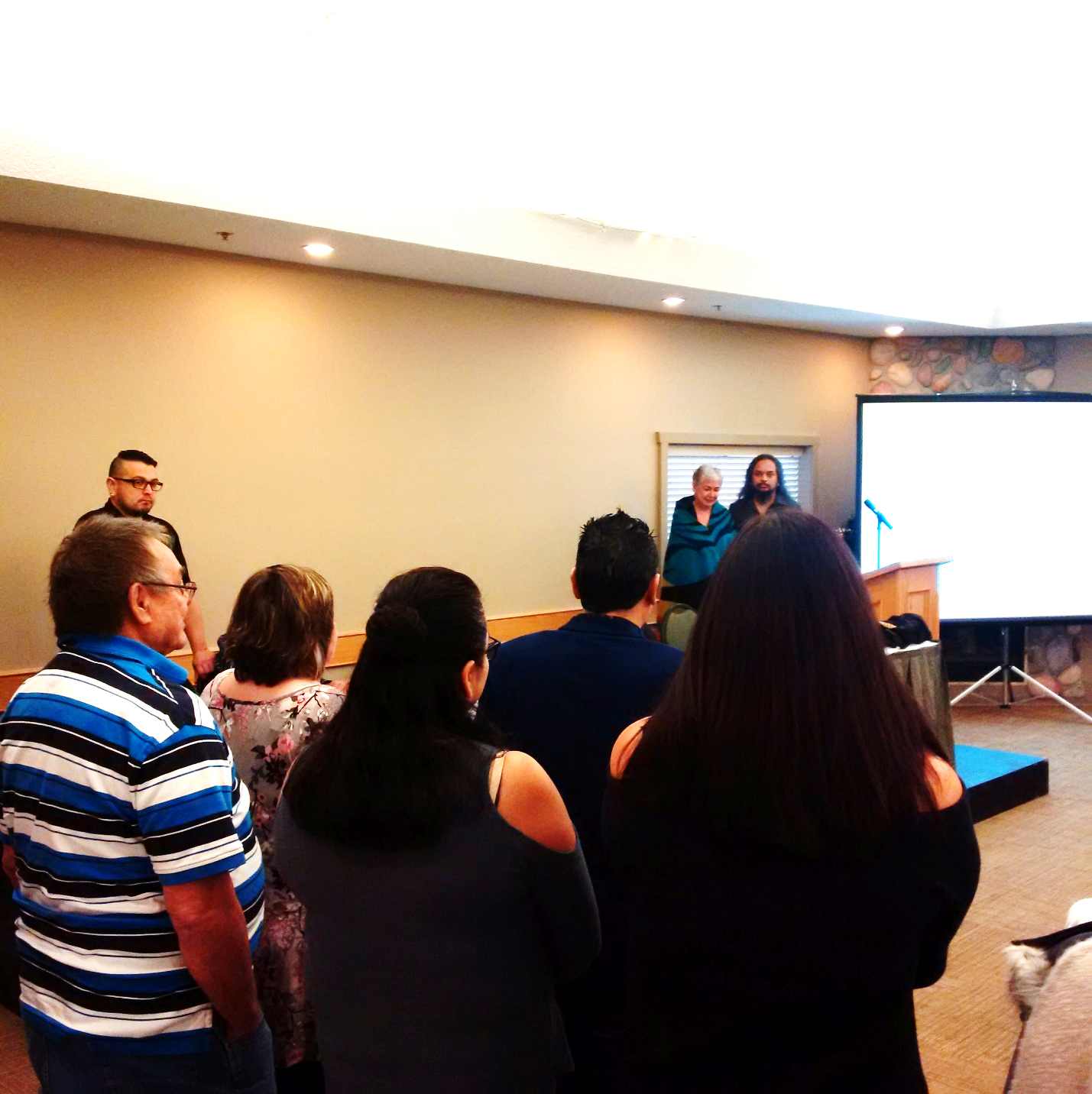
Pauline Jaynst of the Sasamans Society being blanketed by the FNHC and Island Caucus for her work over the years in the service of First Nations Island families.
Pauline Jaynst of the Sasamans Society was blanketed by the FNHC for her work over the years in the service of First Nations Island families, in advance of her coming retirement. The rest of the day included presentations from the Ministry of Child and Family Services, the new Ministry of Mental Health and Addictions, and representatives from EMBC and the Department of Indigenous Services presented an Overview of Emergency Management Model in BC.
Social Determinants of Health
Day three included a leadership dialogue on the social determinants of health as well as presentations from Ministry representatives on Child and Youth Mental Health, Early Years Update. Councillor Paul Sam (Telaxten) - FNHC South Island Coast Salish Representative and Ken Watts - FNHC Central Island Nuu-chah-nulth Representative, both noted the importance of ensuring that Health and Wellness Plans are relevant and up to date.
"Change doesn't happen by accident," said Grand Chief Doug Kelly, Chair of the First Nations Health Council. "It is up to Chiefs and caregivers to confront the system when it fails our people."
The caucus concluded with a technical update from First Nations Health Directors Association. Paul Sam (Telaxten), acknowledged the work of the FNHDA, noting that he relies on the FNHDA for information on what is going on in the communities.
"We are grateful for your feedback and recommendations for changes that you would like to see in our communities," he said. "I am grateful for those who stayed, listened and participated for the last three days."
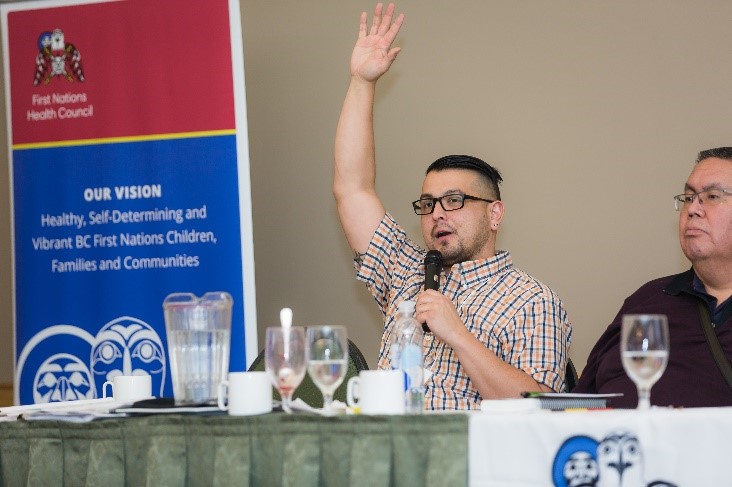
Recently appointed Vancouver Island FNHC representative Ken Watts reflects on an Island perspective of the work of the FNHC and encouraged all communities to have updated health and wellness plans to ensure their voice is reflected in the work of the FNHA and Island Health.
Closing off the event, Vancouver Island Corner Post Bill Cramner offered a song to thank all those who are working for the FNHA. He offered a song recorded by his father in 1938. The words talk about the Chiefs Feast Fires lighting up the world. Mr. Cramner shared that he had also performed this song for Nelson Mandela who made the world a better place for his people and others. By learning this song, and holding onto his language, it provided for his spiritual health and gave him a lot of strength.

